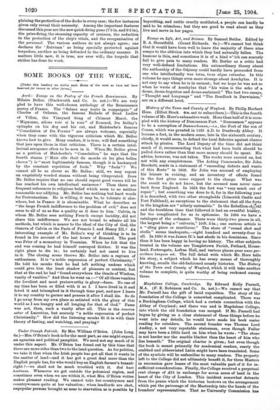[Under this heading we notice such Books of the week
as haus not been reserved for review in other forms.] Consolation of Du Perrier" are always welcome, especially when they come with the vigorous criticism which Mr. Belloc knows how to give. Many readers, it is true, will find something that jars upon them in that criticism. There is a certain intel- lectual arrogance often to be seen in it. When Mr. Belloc gives us a portion of Maleherbe's " Consolation " he says that the fourth stanza (" Mais elle etoit du monde oh lea plus belles theses ") is "most legitimately famous, though it is hackneyed by the constant repetition of fools." Why " fools" ? We Cannot all be as clever as Mr. Belloc : still, we may repeat an exquisitely worded stanza without being vituperated. Does Mr. Belloc require that no one should repeat good verses till he has reached his own intellectual eminence ? Then there are frequent references to religious belief which seem to us neither reasonable nor edifying. Mr. Bello() has nothing but hard words for Protestantism. He is willing, it may be, to tolerate it else- where, but in France it is abominable. What he describes as "the large French indifference to the problem of evil," does not seem to all of us as fine a quality as it does -to him. ' Calvin, in whom Mr. Belloc sees nothing French except lucidity, did not share this indifference. We are not bound to admire all his methods, but which is nearer to the ideal of the City of God, the Geneva of Calvin or the Paris of Francis I. and Henry ILL? An interesting example of Mr. Belloc's way of thinking is to be found in his account of the last hours of Ronsard. The poet was Prior of a monastery in Touraine. When he felt that the end was coming he had himself conveyed thither. It was the right place to die in; he certainly had not cared to live in it. The closing scene throws Mr. Belloc into a rapture of enthusiasm. It is "a noble expression of perfect Christianity." He told his monks that he had left nothing undone which could give him the least shadow of pleasure or content, but that at the end he had "found everywhere the Oracle of Wisdom, vanity of vanities." And then he went on :--" Of all those vanities the loveliest and most praiseworthy is glory—fame. No one of any time has been so filled with it as I. I have lived in it and loved it and triumphed in it through time past, and now I leave it to my country to garner and possess it after I shall die. So do I go away from my own place as satiated with the glory of this world as I am hungry and all longing for that of God." Fame was not, then, such a vanity after all. This is the conroiva satur of Lucretius, but scarcely "a noble expression of perfect Christianity." How did the listening monks fit it in with their theory of fasting, and watching, and praying?


























































 Previous page
Previous page